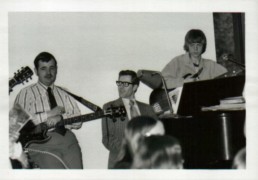Psalms 131
This pic has Beri is on the left and Brooke on the right with cousin Emily in the middle. 1996 in Yosemite National Park. Leigh and I clearly recall that day that a group of Japanese tourists were fascinated with Emily's pure blonde hair. They all wanted a picture with her.
Psalms 131, A Psalm of David
O Lord, my heart is not proud, nor my eyes haughty; Nor do I involve myself in great matters, or in things too difficult for me. Surely, I have composed and quieted my soul; like a weaned child rests against his mother, my soul is like a weaned child within me. O Israel, hope in the Lord, from this time forth and forever.
Understanding this Psalm took a little extra research before clarity soaked in. It was written by David, which is helpful, but even more helpful to know that it was written while he was serving on King Saul’s court. Why is that helpful?
David’s life is summed up in this way:Read more
Psalms 130
Psalms 130, author unknown
I’m taking a break from the book of John and soaking in the book of Psalms this week.
Out of the depths I have cried to You, O Lord. Lord, hear my voice! Let Your ears be attentive to the voice of my supplication. If You Lord, should mark iniquities, O Lord, who could stand? But there is forgiveness with You, that You may be feared. I wait for the Lord, my soul does wait and, in His Word, do I hope...For with the Lord there is lovingkindness, and with Him is abundant redemption. And He will redeem Israel from all his iniquities.
Therefore, there is now no condemnation for those who are in Christ Jesus. Romans 8:1
Psalms 130 is a Penitential Psalm, (I had to look up what that means exactly ;). These Psalms express the sorrow of sin. The Psalmist says, out of the depths I have cried to You, O Lord. At first reading I thought maybe this meant the depth of sorrow from trials and difficulties of life (such as disease, death of a loved one or unexpected earthly tragedy). But the context indicates a depth of pain and sorrow from sin in one's life primarily because our sin dishonors God and our sin condemns us. Read more
Seeing and Believing
As referenced yesterday, this is a pic of the youth choir from my church in 1974. The Overlake Singers!
Seeing and Believing
John 4:39-54
So when the Samaritans came to Jesus, they were asking Him to stay with them; and He stayed there two days. Many more believed because of His word; and they were saying to the woman, ‘it is no longer because of what you said that we believe, for we have heard for ourselves and know that this One is indeed the Savior of the world.
This portion of Scripture has two sections.
- Two days in Samaria which was initiated by Jesus’ contact with the woman at the well.
- Jesus' return to his home in Galilee (around the cities of Nazareth and Cana).
There is a stark contrast between the reception of the people from these two places. Regarding His time in Samaria it says the Samaritans "believed in Him because of the word" and "many more believed because of His word". Further confirmation of the Samaritans faith is revealed in verse 42; "...we have heard for ourselves and know that this One is indeed the Savior of the World." Read more
I've Got Issues
I wanted to be a part of my church youth group choir but I didn't want to sing. So I taught myself how to play bass guitar. They already had an experienced bass guitarist...but they felt sorry for me and let me play anyway. I'm 14 years old.
I've Got Issues
John 4:39-42
“From that city many of the Samaritans believed in Him because of the word of the woman who testified, ‘He told me all the things that I have done.’ So, when the Samaritans came to Jesus, they were asking Him to stay with them; and He stayed two days. Many more believed because of His word; and they were saying to the woman, ‘It is no longer because of what you said that we believe, for we have heard for ourselves and know that this One is indeed the Savior of the world.”
These few verses are too rich to pass over. They are part of an amazing progression here in the book of John. Read more
I Get It!
Last week, my daughter Brooke turned 30. We went on a daddy/daughter date to see the live performance of Les Miserables at the Hobby Center, Houston, TX.
Now, I Get It
John 3 & 4
Jesus used analogies and allegories to teach spiritual truth. In these two chapters, He presents the concepts of being born again and living water. At this time in His ministry, people tended to take Him literally. This caused them some confusion. Because of the impossibility of the allegory, they questioned him and didn’t understand. To them, what Jesus said was non-sensical from a physical standpoint.
But here again, they were spiritually dull and didn’t realize Jesus was teaching them in analogies and allegories. Following are the marvelous analogies that Jesus used. To us, they are rich, profound and vivid, but to the hearers, they were nonsensical. Read more
The Contrarian
Ryker joined the garden club at school. He's the small guy, bottom right, blue shirt with stripped white sleeves. Sofia, Bulgaria.
The Contrarian
John 4, part two
Here in chapter four of John, Jesus is going to reveal that he is the Messiah to the Samaritans. Here we see that Christ's strategy is different than our strategy. It seems to us that everything is wrong about what Jesus does here. We would seek out people of influence to spread the message. If we wanted to impact Samaria, we would go to the leading men of Samaria and convince them first. Our strategy would be that they, the leaders of Samaria, would then influence other Samaritans.
Jesus had a different plan. He took the contrarian path. Typically, Jews don't talk to Samaritans. Typically, Jewish men do not initiate conversations with women, especially a Samaritan woman. Typically, a Rabbi will instruct the men and then the men will teach their wives and children. In this case, the Rabbi, Jesus, taught the woman and then she "left her water pot, and went into the city and said to the MEN..." She taught the men! Read more
Contrasting Individuals
Happy 6th Birthday to my grandson, Ryker, living in Sofia Bulgaria.
Contrasting Individuals
John 4:1-42
“There came a woman of Samaria to draw water. Jesus said to her, ‘Give me a drink.’ Therefore, the Samaritan woman said to Him, ‘How is it that You, being a Jew, ask me for a drink since I am a Samaritan woman,’” (verses 7-9). So the woman left her waterpot, and went into the city and said to the men, ‘come see a man who told me all the things that I have done; this is not the Christ, is it?’ They went out of the city and were coming to Him,” (verses 28-30).
In chapter 3, Jesus interacts with the great teacher of Israel, a pharisee named Nicodemus. A man highly regarded in Israel. In this chapter, Jesus interacts with a Samaritan woman. Not only a Samaritan woman but an immoral sinner previously married five times and currently living with a man. This is a person despised by all Israel. A Jew would not even look at her much less carry on a conversation with her. Read more
2nd Chair
2nd Chair
John 3.22-36
“And they came to John and said to him, ‘Rabbi, He who was with you beyond the Jordan, to whom you have testified, behold, He is baptizing and all are coming to Him.’ John answered and said, ‘A man can receive nothing unless it has been given him from heaven...He must increase, and I must decrease.”
Jesus goes out into a rural area with His disciples and "He was spending time with them and baptizing," verse 22. Interesting that John uses the phrase "spending time with them..." This is undoubtedly referring to time with His disciples. What a wonderful example of discipling and mentoring; “spending time with them.” It would take a lot of work to teach and train the disciples to represent Christ in a hostile world after His departure. There is no shortcut for influencing others. Spending time with them is the key. Read more
Nicodemus & 3:16
My cherished friends, Pastor Frank and Darla Vargo in Alaska.
Nicodemus & 3:16
John 3:1-21
“Now there was a man of the Pharisees, named Nicodemus, a ruler of the Jews; this man came to Jesus by night and said to Him, ‘Rabbi, we know that You have come from God as a teacher; for no one can do these signs that You do unless God is with him.’ Jesus answered and said to him, ‘Truly, truly, I say to you, unless one is born again he cannot see the kingdom of God.’”
Nicodemus, a Pharisee and member of the Sanhedrin, came to Jesus at night. Why at night? Most likely, to avoid suspicion. What would people think if the great teacher of Israel, Nicodemus, is consulting with the radical, Jesus. In verse 10, Jesus refers to him as THE teacher of Israel, indicating he was of the elite of the religious class of Pharisees.
Nicodemus greets Jesus with respectful platitudes; “Rabbi, we know that You have come from God as a teacher; for no one can do these signs that you do unless God is with him.” Jesus brushes off the shallow compliment and deals directly with the heart of Nicodemus. Jesus doesn’t mess around. Read more








